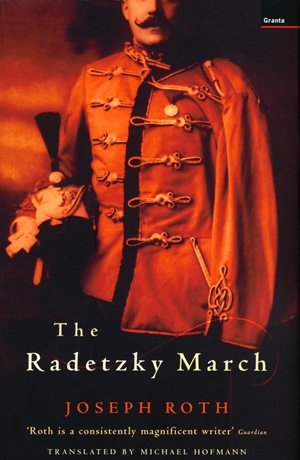Beskrivelse
Joseph Roth's 1932 novel, The Radetzky March, starts with an accident that creates a dynasty. When an infantry lieutenant steps in front of a bullet intended for the young Franz Joseph, the Austro-Hungarian emperor rewards him with wealth, promotion, and a knighthood. Almost overnight, Joseph Trotta is "severed" from his ancestors, and his family is transformed from unremarkable soldiers and peasants living in the outer reaches of the empire to barons and high-ranking officials living near the imperial palace. As long as Franz Joseph is the Kaiser, their status is secure. But when Trotta happens upon a schoolbook account of the event that exaggerates his heroism, he is shaken: He had been driven from the paradise of simple faith in Emperor and Virtue, Truth, and Justice, and, now fettered in silence and endurance, he may have realized that the stability of the world, the power of laws, and the glory of majesties were all based on deviousness.
As World War I approaches and the monarchy's limitations become apparent, Trotta's son and grandson become even further removed from this paradise. They continue to follow the codes of honor and duty, though such behavioral guides become pointless, even burdensome, in a world shorn of simple faith in an emperor. Trotta's grandson Carl Joseph finds his military career overwhelmed by bad horsemanship, alcohol dependency, frivolous roulette and baccarat debts, and misguided love affairs–the kinds of flaws, he thinks, that are inevitable without the self-assurance and practical knowledge that he would have gained had he earned (rather than inherited) his position. Not long ago, he thinks wistfully, his family lived as peasants "in dwarfed huts, making their wives fertile by night and their fields by day." It is here that the Trottas' demise is at its most poignant, as the focus of the narrative shifts from the loss of status to the far more devastating loss of purpose.
In both style and temperament, Roth's novel stands between the 19th and 20th centuries, and the three Trottas could be seen as part of a progression that stretches back to Tolstoy's Prince Andrei and looks ahead to the Mathieu of Sartre's Les Chemins de la Liberté trilogy. Although The Radetzky March illustrates why the monarchy was doomed, and isn't blind to the new nations and ideologies on the horizon, Roth is more interested in his characters' psychology than their politics. And their central difficulty–the bewildering meaninglessness that follows the dissolution of an ideal–has been a fundamental 20th-century dilemma. The Trottas are, in Roth's stunning phrase, "homesick for the Kaiser." One need only substitute "the Chairman" or "Marxism" or "God" to understand the novel's lasting resonance.
—
«The Radetzky March can fairly claim to be one of the great novels of the last century. Its theme, beautifully articulated, is the end of an era. His anthem for a vanished world has the intense, fleeting beauty of a sunset' Sunday Telegraph 'Over recent years, the poet Michael Hofmann's glittering translations of Joseph Roth have single-handedly given a vanished voice fresh resonance in the English-speaking world. Now Hofmann has surpassed himself with the jewel in Roth's crown. The Radetzky March is a majestically assured and engaging novel' Boyd Tonkin, Independent 'He saw, he listened, he understood. The Radetzky March is a dark, disturbing novel of eccentric beauty… If you have yet to experience Roth, begin here, and then read everything' Eileen Battersby, Irish Times 'The true reading pleasure afforded by the rich environment Roth captures may well have increased over time, while the schisms at the heart of Europe continue to fascinate. It seems that we are rediscovering in twentieth-century Central European literature classics for a new millennium» Time Out



